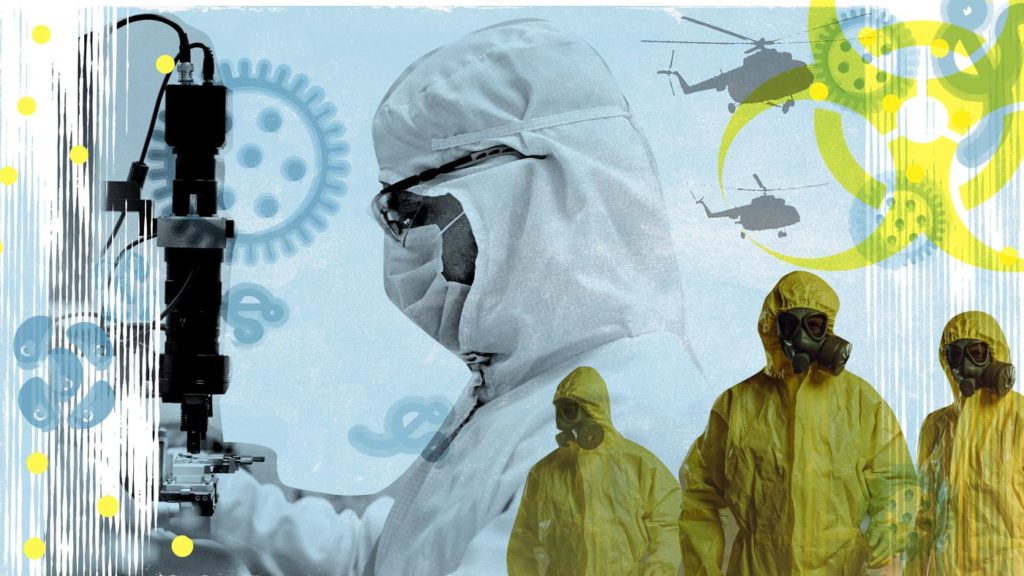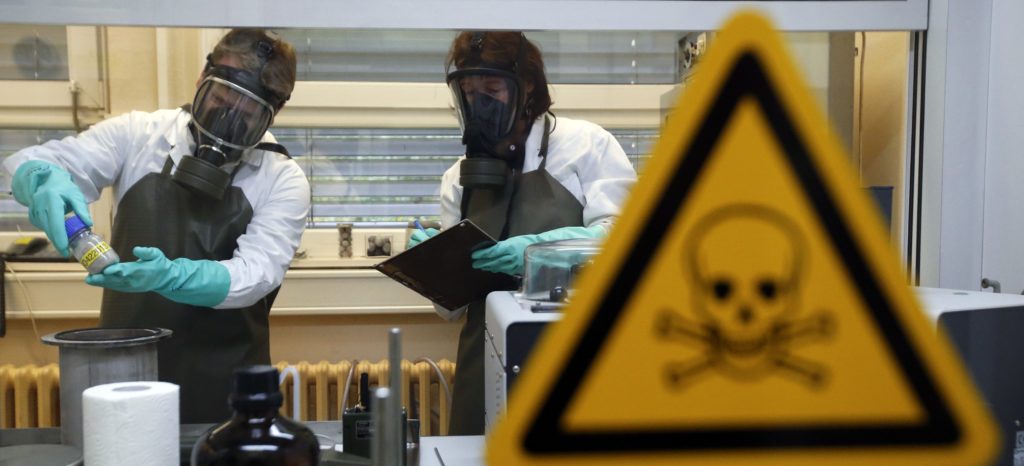The relations between states always witnessed various changes based on major events that compelled the leaders of the nations to redefine their positions in the political landscape of the world. The outbreak of wars, the signing of treaties, creating alliances, and the outbreak of epidemic diseases proved to be the turning points of world history. Besides other forces changing the conventional political patterns of the world, the spread of infectious diseases affected the populous centers of the world without respecting the territorial borders. An exceptional combination of naturally occurring and intentionally spreading epidemic diseases under the broader rubric of biological threats usually causes a large number of human sufferings. The most populous nations facing an un-measurable strength of deaths and disabilities became vulnerable before the spread of pandemic illnesses. An uncontrollable level of such sicknesses globally made the nations less secure and more defenseless. Over time, an escape from the threats of such biological catastrophes became an impossible task for the nations.
Given the above mentioned scenario, the recent phase of Coronavirus and its dramatic spread in the world can easily be examined by estimating the widespread human sufferings of the different regions. This viral atmosphere across the borders, no doubt, is demanding an adequate mechanism for treating the individual patients. However, the prevention of its further spread within different communities has become a difficult task for the international community. The Coronavirus Disease started its spread in 2019, commonly known as COVID-19. This infectious disease-causing severe acute respiratory syndrome has become a global issue, and its domino effects are rapidly making various communities of different countries more vulnerable. The helpless leaders from around the world are trying to invest their efforts in taking precautionary measures coupled with adopting protective policies to secure their citizens. The pandemic COVID-19 was first identified in China (Wuhan) at the end of 2019 and gradually reached an alarming level by resulting in hundreds of deaths from different countries apart from leaving thousands affected. A minor level of recoveries besides the skyrocketing level of Corona cases reported from different counties.
Under a broader vision of non-traditional security threats, the COVID-19 can be studied as an essential event in the history of humanity, which will leave remarkable impacts on the international system. Apart from countless reports prepared by various health organizations, the political impacts of Coronavirus cannot be marginalized. This disease has affected mainstream social infrastructures, political systems, and outdated conventional legislative activities of affected states. The economic crisis caused by this pandemic syndrome, apart from canceled and postponed national and international events from around the globe, multiplied the impacts of COVID-19. Additionally, multiple deaths of politicians and the rescheduling of the electoral process of various states due to the fear of the spread of Coronavirus augmented the ongoing panic in the people. Beyond offsetting the traditional social and political infrastructures of the states, this epidemic illness disturbed the inter-state relations by negatively effecting a worldwide culture of trade and travel. No doubt, like other epidemic diseases, the Corona plague will also be controlled sooner or later, but its impacts on the international system will reshape the global order. In other words, the end of Coronavirus from the world will provide greater relief to humanity from natural disasters, but it will change the course of world history in different ways. In order to comprehend the probable future of the international system in the post-Corona scenario, the following situations will likely shape the future of the world.

Vanishing Globalization: The concept of globalization has been badly affected as the result of COVID-19 because this universal problem has shaken the foundations of the international system. People from different corners of the world have started visualizing the world from a different angle in which the features of a globalized world have started losing their relevance to the international system. Even the political leaders are reluctant to share their global agendas while opposing widespread opportunities for trade and travel in the world. Some analytical circles of the world agreed to call this pandemic a global bug, and it will reshape the structure of inter-state interaction. The leading state authorities will try to prefer the protection of their borders as an adequate measure to defend their people. Another group of political leaders will try to support the concept of nationalism by defending their domestic systems in order to manage the re-occurrence of any crisis in the future. It is more appropriate to say, the politics of the epidemic will marginalize the role of globalization by emphasizing a system of state-government over the people. In this system, the citizens will look at their leaders and consider them the viable sources of protecting them from crises instead of relying upon foreign funding. Moreover, the traditional governing apparatuses of states while living under self-imposed isolation will be reluctant to formulating their trade connection with other nations. Consequently, a world of less-opened order, less-free travel, and less-pleasant transnational economic values will introduce a system of retreat from globalization.
Economic Challenge: The outbreak of Coronavirus form China and its dramatic spread in the world has traumatized the financial systems of states and broadly resulted in the collapse of the global economic system in which the leading economists of different countries are failed to protect their nations. COVID-19, the major event of the leap year, has brought a major economic crisis in the world by upsetting the performance of national and international organizations. In this way, the collapse of the international financial market sabotaged the consistent trade patterns of stock exchanges around the globe. The disappointing economic surveys of even economically developed and technologically advanced states have alarmed the whole world. It further has diminished the chances of global investors due to the reduction of chances of international trade and travel. The upsetting western economic circles are forced to raise their anti-Chinese positions while calling the post-Corona world as a new world in which China will not be an economic power. Now, the end of the Chinese era will provide sufficient space to the other powers, or it will compel Beijing to recover its economic rise again. No doubt, China is the first victim of Coronavirus, but it is trying to lead the world in overcoming this pandemic plague. Besides fracturing the concept of the Chinese economic rise, the world of new economic challenges will change the role of multinational organizations parallel to altering the performance of business communities in the world. Moreover, the spread of this disease in the world has stopped the multinational trading companies from investing in geographically selected areas.
Societal Changes: A post-Corona world will formulate an international system of new realities by creating a different societal setup that will change the existing social values. The populous societies will witness the reduction of travel trends in the world because the psychological consequence of COVID-19 cannot be managed easily soon. The Corona nightmare will be under control by leaving its fears in mankind. Witnessing from human history, the spread of pandemic diseases generally affects different ethnic and religious circles of the nations by making them insecure and anxious. On the one hand, the scarcity of resources, the rise of unemployment, lack of health facilities, inadequate social welfare systems, and inefficient governing setups of the states change the societal apparatus of the nations. On the other hand, the consequences of such epidemic disasters raise the trust-deficit environment between the states. In the future, this environment will force the state governments to strengthen their capabilities to cope with any crisis. Moreover, the demands of social security will force the leaders to fulfill the demands of their citizens by providing more facilities and opportunities. In this way, the national leaders will prefer to emphasize their societies and companies instead of relaying foreign assistance.
Biological Warfare: The biological challenges attached to this COVID-19 will shape a world carrying the politics of biological agents in which the states will try to empower their traditional defensive mechanism with biological elements. It will further change the nature of warfare, and the leading security architectures of the states will try to obtain biological weapons in order to achieve their strategic objectives. Moreover, the stockpiling of vaccinations of various bio-agents will add another layer of politics between states because the chances of creating an Eradiating vaccination of any bio-agent will be restricted to a few nations. A number of technical and economic hurdles will not let all the states protect their population from various biological catastrophes in the future. The availability of viral-biology and vaccine-technology will not let all the states to stand equally in the international system. In other words, the conception of biological warfare will prevail in the international system, and the use of bio-weapon or threats of bio-agents will be employed as an adequate mean to secure strategic objectives. Presently, all the states are united in overcoming the Corona plague by providing relief services to each other beyond their political differences, but the future politics of bio-agents will add another dimension in the conventional global political structures. The united efforts of various governments can reduce the chances of reassurance of this viral syndrome in the future parallel to the politics of pandemic as the result of this COVID-19. This politics cannot be eliminated in the future.

Threats of Bio-terrorism: There is a major concern of the international community in which most people started calling the Coronavirus a bio weapon. In the future, it could fascinate the clandestine networks of different terrorist groups. An updated version of bio terrorism in the post-Corona scenario will hamper the conventional responses of nations to the threats of bio terrorism. Apart from terrorist networks, organized criminal groups could also use it as an appropriate tool for gaining monetary benefits or for the achievement of their interests. The usage of biotechnology as a weapon for the achievement of strategic advantages and the security of obtained bio-weapons will become serious concerns of the international community. The capabilities of states to prepare toxin-agents, including chemical and biological materials, will raise the probable scenarios of bio terrorism. Therefore, a post-Corona world will likely see an international system vulnerable to the threats of bio terrorism.
New Global Politics: The post-Corona world is probable to witness a new international system where the great power competition will face an altered version of power politics. Presently, the existing confrontational designs between China and the US have taken a new turn in which the American state officials are blaming Beijing as the culprit of spreading the virus from Wuhan. In return, Beijing has started mentioning the speculations that the US military has used the virus as a weapon against China. The blame-game between Beijing and Washington is not likely to vanish in the near future. An intense hostility between two superpowers will provide sufficient space for other power, or it will let other power to take benefit of Sino-US aggression. The most probable future of the world will allow both Chinese and American governments to start formulating their alliances in the different regions under a global bipolar system. This polarization, based on Chinese-American values, will create a new world while effecting the political designs of different regions. Concerning the ongoing blame-game between Beijing and Washington, more conspiracy theories are likely to add further dimensions in the Sino-US confrontation. In other words, the debate on defining the Coronavirus as a natural disaster or a man-made disaster will leave a significant impact on the global political order. In response to the emerging features of a new world, the national capitals from different regions will try to redefine their position while adjusting their geo-strategic interest in a new world. In this way, an updated version of global politics will try to change the traditional concepts of inflexible rivals, potential competitors equivalent to modifying the concepts of cooperative partners and trustworthy allies.
Extended Anarchy: Because of circumstances mentioned above, an international environment of extended anarchy will prevail in world politics. States will try to relay on their economic capacities to prepare themselves against future crises. On the one hand, the national leaders will try to cooperate with their counterparts of another region for the formulation of a more coordinated and less confrontational approach. On the other hand, the leading state authorities will be reluctant to relaying the cooperation of other countries. Consequently, the policymakers will prefer to adopt a policy of self-reliance, which will not only empower the national infrastructure of the states, but it will also reduce the chances of depending on other governments. It will further let the security architectures of the nations to achieve strategic autonomy in defense matters. Moreover, a shattered idea of global economic governance will hamper the existing economic systems of states, and it will make states more vulnerable to the financial crisis. It will be a retreat from a growing culture of the global economy, which will further structure new economic directions for the nations by complicating the international anarchical environment.
In order to counter the spread of diseases around the globe, an updated approach of concentrated efforts cemented in coordinated interaction between states is needed. The states living in a prolonged period of self-isolation and economic crisis before inadequate governing capabilities of the national governments have reduced the chances of cooperation between nations. The outbreak of Coronavirus has initiated a new debate in the international system, and people around the world, mainly consisting of public health officials, leading policymakers, academic researchers, and security pundits have started exploring the probable future of world order in the post-Corona scenario. This pandemic outbreak has launched an inclusive debate on the various topic mainly covering the social, political, and economic fields. No matter how the Coronavirus erupted and engulfed the whole international system without sparing any nation, but its impact on the world cannot be simply be ignored. A wide range of consequences after the elimination of Corona episode from the world will affect living standards of people parallel to disrupting the financial markets and national governments. Moreover, a permanent shift in the political, social, and economic features of the world will create a new future of the world in which the leading academic and political circles of the international community will witness a different world.




